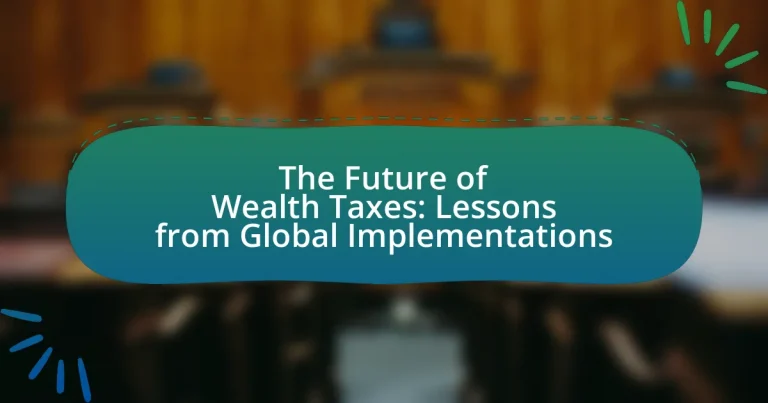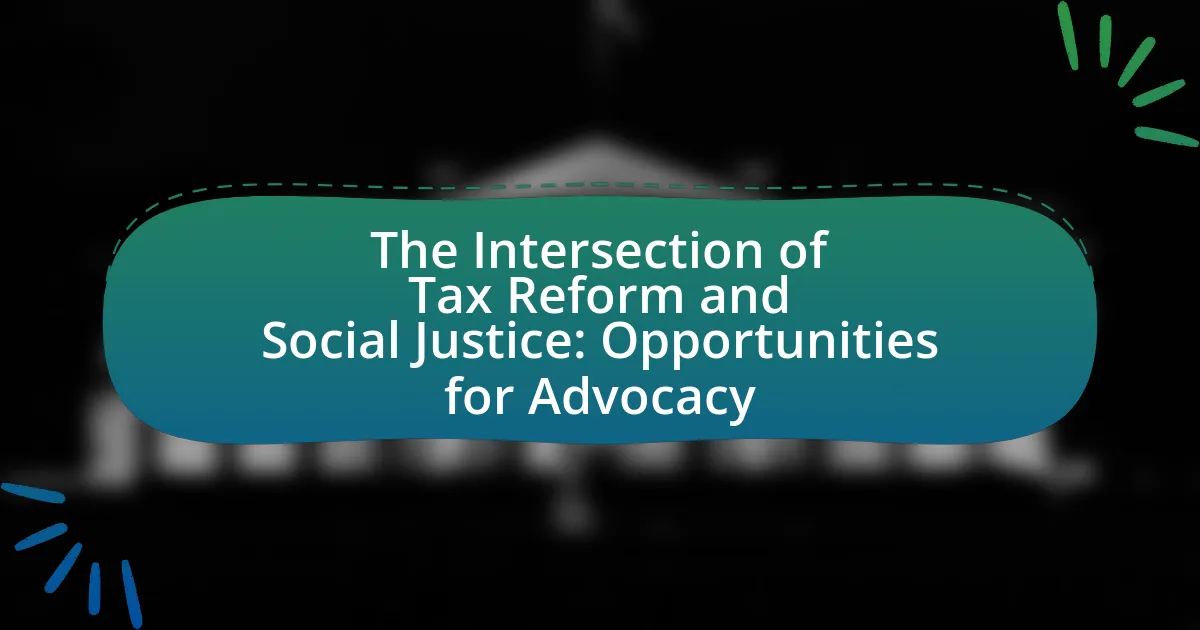Wealth taxes are levied on the net worth of individuals, targeting assets such as property and investments, and are designed to reduce economic inequality by redistributing wealth and funding public services. This article examines the characteristics, global trends, and challenges associated with wealth taxes, highlighting successful implementations in countries like France, Spain, and Norway. It also discusses the social implications of wealth taxes, their impact on high-net-worth individuals, and best practices for effective policy design and compliance. The future of wealth taxes is explored, emphasizing the potential for increased adoption and reform in response to economic changes and public sentiment towards equity.

What are Wealth Taxes and Why Do They Matter?
Wealth taxes are taxes imposed on the net worth of individuals, targeting assets such as property, investments, and savings. They matter because they aim to reduce economic inequality by redistributing wealth, generating revenue for public services, and addressing social disparities. For instance, countries like France and Spain have implemented wealth taxes, which have contributed to funding social programs and reducing budget deficits. The effectiveness of these taxes in achieving their goals is often debated, but they remain a significant tool in discussions about fiscal policy and social equity.
How do wealth taxes differ from income taxes?
Wealth taxes differ from income taxes primarily in their focus; wealth taxes are levied on an individual’s net worth, while income taxes are imposed on earnings generated within a specific period. Wealth taxes assess the total value of assets owned, such as property, investments, and savings, regardless of whether those assets generate income. In contrast, income taxes are calculated based on wages, salaries, dividends, and other forms of income received during a tax year. For example, countries like France and Spain have implemented wealth taxes that target high-net-worth individuals, while the United States primarily relies on income taxes as its main revenue source. This distinction highlights the different economic implications and policy objectives associated with each tax type.
What are the key characteristics of wealth taxes?
Wealth taxes are characterized by their focus on taxing the net worth of individuals or households rather than income. These taxes typically apply to assets such as real estate, stocks, and other investments, and are often progressive, meaning that higher net worth individuals pay a higher percentage. For instance, countries like France and Spain have implemented wealth taxes with varying rates and exemptions, reflecting a trend towards addressing wealth inequality. The implementation of wealth taxes can also lead to increased administrative complexity and potential capital flight, as seen in cases where high-net-worth individuals relocate to avoid taxation.
Why are wealth taxes considered a tool for economic equality?
Wealth taxes are considered a tool for economic equality because they aim to redistribute wealth from the richest individuals to fund public services and social programs that benefit the broader population. By imposing taxes on net worth rather than income, wealth taxes target accumulated assets, which are disproportionately held by the wealthy. For instance, countries like France and Spain have implemented wealth taxes, resulting in increased funding for education and healthcare, thereby reducing inequality. Studies show that wealth taxes can decrease the wealth gap; for example, the OECD reported that wealth taxes can contribute to a more equitable distribution of resources, enhancing social mobility and economic stability.
What are the global trends in implementing wealth taxes?
Global trends in implementing wealth taxes indicate a growing interest among countries to address income inequality and generate revenue. Recent data shows that countries like Spain, France, and Argentina have reintroduced or strengthened wealth taxes, reflecting a shift towards progressive taxation. For instance, Spain’s wealth tax, which targets individuals with net assets above a certain threshold, has been a significant source of revenue since its reintroduction in 2011. Additionally, the OECD reported in 2021 that wealth taxes are being considered or implemented in various forms across multiple jurisdictions, highlighting a global movement towards taxing the affluent more heavily to fund social programs and reduce disparities.
Which countries have successfully implemented wealth taxes?
Countries that have successfully implemented wealth taxes include France, Spain, Norway, and Switzerland. France introduced a wealth tax known as the Impôt de Solidarité sur la Fortune (ISF) in 1989, which was later replaced by a real estate wealth tax in 2018. Spain has a wealth tax that varies by region, with rates ranging from 0.2% to 3.5%. Norway has maintained a wealth tax since 1892, currently set at 0.85% on net wealth above a certain threshold. Switzerland allows cantons to impose their own wealth taxes, leading to varying rates across the country, with some cantons charging up to 1%. These implementations demonstrate the feasibility of wealth taxes in different economic contexts.
What challenges have countries faced in enforcing wealth taxes?
Countries have faced significant challenges in enforcing wealth taxes, primarily due to issues of tax evasion and avoidance. Wealthy individuals often have the means to relocate their assets or themselves to jurisdictions with more favorable tax regimes, undermining the effectiveness of wealth taxes. For example, a study by the International Monetary Fund in 2021 highlighted that high-net-worth individuals frequently utilize offshore accounts and trusts to shield their wealth from taxation. Additionally, the complexity of accurately assessing and valuing assets, particularly non-liquid assets like real estate or art, complicates enforcement efforts. This complexity can lead to disputes over valuations and compliance, further hindering the implementation of wealth taxes.

What Lessons Can Be Learned from Global Implementations of Wealth Taxes?
Global implementations of wealth taxes reveal several key lessons, primarily that effective design and administration are crucial for success. Countries like France and Spain have faced challenges with wealth taxes due to high evasion rates and administrative complexities, leading to their eventual repeal or modification. For instance, France’s wealth tax was abolished in 2017 after it was found to drive wealthy individuals abroad, resulting in a significant loss of tax revenue. Conversely, countries like Switzerland demonstrate that well-structured wealth taxes can be effective when combined with robust compliance measures and public acceptance. The experience of these nations underscores the importance of balancing tax rates with incentives to minimize capital flight and ensure equitable contributions from the wealthy.
How have different countries structured their wealth tax systems?
Different countries have structured their wealth tax systems in various ways, reflecting their economic priorities and social policies. For instance, countries like France and Spain have implemented progressive wealth taxes that target individuals with net worth above a certain threshold, with rates increasing based on the level of wealth. In contrast, Switzerland employs a decentralized approach, allowing cantons to set their own wealth tax rates, resulting in significant variation across the country. Additionally, Norway has a wealth tax that applies to both individuals and corporations, with a flat rate applied to net wealth exceeding a specified amount. These structures illustrate the diverse methodologies countries adopt to tax wealth, influenced by factors such as political climate, economic conditions, and social equity goals.
What are the common features of successful wealth tax systems?
Successful wealth tax systems typically feature clear definitions of taxable wealth, progressive tax rates, effective enforcement mechanisms, and regular assessments. Clear definitions ensure that all forms of wealth, including real estate, financial assets, and business holdings, are accounted for, which enhances compliance and reduces loopholes. Progressive tax rates, where higher wealth brackets are taxed at higher rates, promote equity and generate significant revenue, as evidenced by countries like Switzerland and Norway, which have successfully implemented such structures. Effective enforcement mechanisms, including robust reporting requirements and penalties for non-compliance, are crucial for maintaining the integrity of the tax system, as seen in France’s wealth tax reforms. Regular assessments allow for adjustments based on economic conditions and inflation, ensuring that the tax system remains relevant and effective over time.
What mistakes have been made in wealth tax implementations?
Mistakes made in wealth tax implementations include inadequate valuation methods, which often lead to discrepancies in tax assessments. For instance, countries like France faced challenges with asset valuation, resulting in tax evasion and compliance issues. Additionally, the complexity of tax regulations has deterred compliance; in Spain, the wealth tax has been criticized for its convoluted rules, leading to confusion among taxpayers. Furthermore, the lack of clear definitions regarding taxable assets has resulted in loopholes, as seen in the case of Switzerland, where wealthy individuals exploited ambiguities to minimize their tax liabilities. These mistakes highlight the need for clearer guidelines and more effective enforcement mechanisms in future wealth tax policies.
What impact have wealth taxes had on economies and societies?
Wealth taxes have generally led to increased government revenue and reduced income inequality in economies and societies where they have been implemented. For instance, countries like France and Spain have utilized wealth taxes to fund social programs and public services, resulting in a more equitable distribution of resources. In France, the introduction of a wealth tax in 1982 contributed to a significant increase in tax revenue, which was used for public investment and social welfare. However, the impact has been mixed; some studies indicate that wealth taxes can lead to capital flight and reduced investment, as high-net-worth individuals may relocate to avoid taxation. The OECD reported that wealth taxes can discourage savings and investment, potentially slowing economic growth. Overall, while wealth taxes can enhance social equity, their implementation requires careful consideration of potential economic repercussions.
How do wealth taxes affect high-net-worth individuals?
Wealth taxes significantly impact high-net-worth individuals by reducing their disposable income and incentivizing asset reallocation. High-net-worth individuals often face increased financial burdens due to these taxes, which can lead to changes in investment strategies, such as moving assets to tax-favorable jurisdictions or shifting investments into less taxable forms. For instance, countries like France and Spain have implemented wealth taxes that resulted in capital flight, as wealthy individuals sought to minimize their tax liabilities. This trend illustrates how wealth taxes can lead to economic behaviors that ultimately affect national revenue and investment landscapes.
What are the social implications of wealth taxes?
Wealth taxes can lead to increased social equity by redistributing resources from the wealthy to fund public services and social programs. This redistribution can reduce income inequality, as evidenced by countries like Sweden and France, where wealth taxes have contributed to a more equitable society. Additionally, wealth taxes can foster social cohesion by addressing disparities in wealth accumulation, which can lead to social unrest if left unaddressed. Historical data shows that nations implementing wealth taxes often experience a temporary increase in tax revenue, which can be reinvested into education, healthcare, and infrastructure, further enhancing social welfare.

What is the Future of Wealth Taxes?
The future of wealth taxes is likely to see increased implementation and reform as governments seek to address income inequality and fund public services. Countries like Spain and France have already experimented with wealth taxes, and their experiences may influence broader adoption. For instance, a 2021 report from the International Monetary Fund highlighted that wealth taxes could generate significant revenue, estimating potential yields of 1-3% of GDP in various economies. As public sentiment shifts towards greater equity, wealth taxes may become a more prominent tool in fiscal policy, particularly in response to the economic impacts of the COVID-19 pandemic.
How might wealth taxes evolve in response to economic changes?
Wealth taxes may evolve to become more progressive and targeted in response to economic changes, particularly during periods of rising inequality or economic downturns. Historical examples, such as the implementation of wealth taxes in countries like France and Spain during economic crises, demonstrate that governments often adjust tax structures to address fiscal needs and social equity concerns. For instance, during the 2008 financial crisis, several nations reconsidered their wealth tax policies to increase revenue from the wealthiest individuals, reflecting a shift towards greater economic equity. This trend suggests that as economic conditions fluctuate, policymakers may adapt wealth taxes to ensure they effectively address disparities and generate necessary public funding.
What role will technology play in the administration of wealth taxes?
Technology will play a crucial role in the administration of wealth taxes by enhancing data collection, analysis, and compliance monitoring. Advanced data analytics and artificial intelligence can streamline the identification of high-net-worth individuals and their assets, improving the accuracy of tax assessments. For instance, countries like Sweden have successfully implemented digital platforms that integrate various data sources, allowing tax authorities to efficiently track wealth and ensure compliance. This technological integration not only reduces administrative costs but also increases transparency and reduces tax evasion, as evidenced by the increased revenue reported in jurisdictions that have adopted such systems.
How can policymakers ensure fairness in wealth tax systems?
Policymakers can ensure fairness in wealth tax systems by implementing progressive tax rates that increase with the level of wealth, thereby reducing the tax burden on lower-income individuals while placing a greater responsibility on the wealthiest. This approach is supported by evidence from countries like Sweden and France, where progressive wealth taxes have been shown to reduce income inequality and generate significant revenue for public services. Additionally, incorporating exemptions for essential assets, such as primary residences and small businesses, can protect middle-class families from undue financial strain, further enhancing fairness.
What are the best practices for implementing wealth taxes?
The best practices for implementing wealth taxes include establishing clear definitions of taxable wealth, ensuring accurate valuation methods, and maintaining transparency in tax administration. Clear definitions help avoid ambiguity regarding what constitutes wealth, which can include assets like real estate, stocks, and other investments. Accurate valuation methods are crucial, as they ensure that wealth is assessed fairly and consistently; for instance, countries like Switzerland utilize periodic revaluations to reflect current market conditions. Transparency in tax administration fosters public trust and compliance, as seen in countries like Norway, where detailed reporting requirements are enforced. These practices collectively enhance the effectiveness and fairness of wealth tax systems.
What strategies can governments use to improve compliance?
Governments can improve compliance with wealth taxes by implementing clear communication strategies, enhancing enforcement mechanisms, and providing incentives for voluntary compliance. Clear communication ensures that taxpayers understand their obligations and the benefits of compliance, which can lead to higher adherence rates. Enhanced enforcement mechanisms, such as audits and penalties for non-compliance, serve as deterrents and encourage individuals to meet their tax responsibilities. Additionally, offering incentives, such as reduced penalties for early payment or tax credits for compliance, can motivate taxpayers to fulfill their obligations. Evidence from countries like Sweden and Denmark shows that these strategies have effectively increased compliance rates in wealth tax systems.
How can public perception of wealth taxes be positively influenced?
Public perception of wealth taxes can be positively influenced by effectively communicating their benefits and addressing misconceptions. Clear messaging that highlights how wealth taxes can fund essential public services, such as education and healthcare, can foster support. For instance, a study by the Institute on Taxation and Economic Policy found that public investment funded by taxes can lead to improved economic outcomes, which resonates with citizens’ interests. Additionally, transparency in how tax revenues are utilized can build trust, as evidenced by successful wealth tax implementations in countries like Norway, where citizens see tangible benefits from their contributions.
What practical steps can be taken to advocate for effective wealth tax policies?
To advocate for effective wealth tax policies, individuals and organizations can engage in grassroots mobilization, policy research, and coalition building. Grassroots mobilization involves organizing community events and campaigns to raise awareness about wealth inequality and the benefits of wealth taxes, as seen in successful movements in countries like France, where public support significantly influenced policy changes. Conducting thorough policy research provides evidence-based recommendations for tax structures that can be effective, drawing on examples from countries like Norway, which has successfully implemented wealth taxes that contribute to social equity. Coalition building with diverse stakeholders, including economists, social justice organizations, and political leaders, can amplify advocacy efforts, as demonstrated by the collaboration seen in the United States during discussions on wealth tax proposals.




